九年级英语unit1-5复习
人教版九年级英语知识点归纳Unit1-5

九年级全一册Unit 1 How can we become good learners? 重点短语和固定搭配Section Awork with sb. 和...合作/一起工作listen to tapes 听磁带ask sb. for help 向某人寻求帮助study for a test 备考study by doing sth. 通过...方法学习have a conversation with sb. 和某人谈话read aloud 大声朗读practice pronunciation 练习发音learn a lot 学到很多speaking skills 口语表达能力spoken English 英语口语finish doing sth. 结束做某事give a report 作报告have a report 听报告at first 一开始first of all 首先,第一be patient 耐心be patient with sb. 对某人有耐心be patient of sth. 忍耐某事the secret to ...的秘诀learn to do sth. 学习做某事so ... that 太...以至于...most of the time 大部分时间be afraid of sth. 害怕某物be afraid to do 因害怕而不敢做because of sth. 由于;因为poor pronunciation 糟糕的发音watch a moviewatch an English moviefall in love with 强调动作性be in love with 强调状态性begin to do = begin doing 开始做某事at the beginning of 在...的开始body language 肢体语言help sb. do sth. = help sb. to do sth.= help sb. with sth. 帮助某人做某事as well 也a piece of cake 小菜一碟It serves you right. 你活该want sth. 想要某物want to do sth. 想要做某事want sb. to do sth. 想要某人做某事look up sth. in a dictionary 查字典have a better understanding of对...有更好的理解the meaning of ...的意思repeat out aloud 大声重复take notes 做笔记do exercises 做练习read a newspaper/ read newspaperskeep a diary in English 用英语写日记Section Bmake mistakes/ make a mistake 犯错误increase to 1,000 增加到increase by 10% 增加了at a speed of = at the speed of 以... 的速度be born with 天生具有the ability to do ......的能力depend on 取决于;若接动词,用V-ing learning habits 学习习惯have ... in common 有共同点be interested in sth./ doing sth. 对...感兴趣pay attention to 注意;若接动词,用V-ing connect ... with 把...与... 联系起来be connected with sth. 与...相连get bored 变得无聊be good at 在...方面做得好;擅长于be good for 对...有好处be good to 对...友善Practice makes perfect. 熟能生巧。
新目标英语九年级Units 1-5复习过关测试题

.
一
He
is
’
w
il l
.
c o m e
a n
d pla y
B
w
it h
’
m e
if h e
—
—
。
bu s y
A
.
.
W On w
t
be
he
笔试 部分
C is
.
n
t
0 u
D
、
i ll b e
w
(
Ⅱ 选择填 空
.
)3 5
—
.
C
ld y o u lo k
u
is it is it
v
v
—
ll
.
B
y
.
he
he
ill y o
A
.
i ge tt
n
g
a w a
B
.
i g e tt
n
g g
—
u
a
p
C D he
r s e
.
w o u
(
)3 2
C g e t tin g o f My d a u g ht e
.
一
D ge
.
ttin to
lo n g
—
.
he
n
yo u
w
A
.
I ha
v e
n o
t im
e
B D
.
I d
’
’
r a
t he
v e
r
九年级上册英语unit1-unit5重点短语和句型

Unit 1 How can we become good learners? 【一】重点短语1. good learners 优秀的学习者 2. work with friends 和朋友一起学习3. study for a test 备考4.have conversations with 与……交与……交谈5.speaking skills 口语技巧6.a little 有点儿7.at first 起初起先8.the secret to... .......的秘诀9.because of 因为10.as well 也11.look up 查阅;抬头看12.so that 以便,为了13.the meaning of …………的意思14.make mistakes 犯错误15.talk to 交谈16.depend on 依靠依赖17.in common 共有的18.pay attention to 注意关注19. connect …with …把……联系20.for example 例如21.think about 考虑22.even if 即使尽管纵容23.look for 寻找24.worry about 担心担忧25.make word cards 制作单词卡片26.ask the teacher for help 向老师求助27.read aloud 大声读28.spoken English 英语口语29.give a report 作报告30.word by word 一字一字地31. so……that 如此……以至于32.fall in love with 爱上33.something interesting 有趣的事情34.take notes 记笔记35.how often 多久一次36.a lot of 许多37.the ability to do sth. 做某事的能力38.learning habits 学习习惯39.be interested in 对……感兴趣40.get bored 感到无聊【二】重点句型1.提建议的句子:①What/ how about +doing sth.? 做…怎么样?如:What/ How about going shopping? ②Why don't you + do sth.? 你为什么不做…?如:Why don't you go shopping? ③Why not + do sth. ? 为什么不做…?如:Why not go shopping? ④Let's + do sth. 让我们做…吧。
新版九年级英语1---5单元知识点
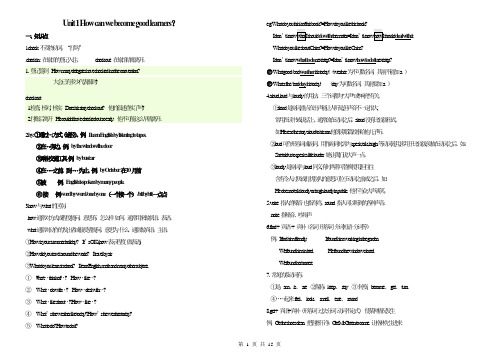
U ni t 1 H o w c an we be c om e g o od l e ar ne rs?一、知识点1.c h e c k不及物动词,“打钩”.c h e c k i n:在旅馆的登记入住。
c h e c k o u t:在旅馆结账离开。
1.登记签到 H o w m a n y d e l e g a t e s h a v e c h e c k e d i n a t t h e c o n v e n t i o n?大会已有多少代表报到?c h e c k o u t1.检查,核对,核实 D o e s h i s s t o r y c h e c k o u t?他的叙述查实了吗?2.付账后离开 H e c o u l d n't h a v e c h e c k e d o u t s o e a r l y.他不可能这么早就离开。
2.b y:①通过….方式(途径)。
例:I l e a r n E n g l i s h b y l i s t e n i n g t o t a p e s.②在….旁边。
例:b y t h e w i n d o w/t h e d o o r③乘坐交通工具例:b y b u s/c a r④在……之前,到……为止。
例:b y O c t o b e r在10月前⑤被例:E n g l i s h i s s p o k e n b y m a n y p e o p l e.⑥接例w o r d b y w o r d/o n e b y o n e(一个接一个) /b i t b y b i t(一点点)3.h o w与w h a t的区别:h o w通常对方式或程度提问,意思有:怎么样如何,通常用来做状语、表语。
w h a t通常对动作的发出者或接受者提问,意思为什么,通常做宾语,主语。
①H o w i s y o u r s u m m e r h o l i d a y? I t’s O K.(h o w表示程度做表语)②H o w d i d y o u t r a v e l a r o u n d t h e w o r l d? I t r a v e l b y a i r.③W h a t d o y o u l e a r n a t s c h o o l? I l e a r n E n g l i s h,m a t h a n d m a n y o t h e r s u b j e c t s.①W h a t…t h i n k o f…? H o w…l i k e…?②W h a t…d o w i t h…? H o w…d e a l w i t h…?③W h a t…l i k e a b o u t…?H o w…l i k e…?④W h a t’s t h e w e a t h e r l i k e t o d a y?H o w’s t h e w e a t h e r t o d a y?⑤W h a t t o d o?H ow t o d o i t?e.g.W h a t d o y o u t h i n k o f t h i s b o o k?=H o w d o y o u l i k e t h i s b o o k?I d o n’t k n o s h o u l d d o w i t h t h e m a t t e r.=I d o n’t k n o s h o u l d d e a l w i t h i t.W h a t d o y o u l i k e a b o u t C h i n a?=H o w d o y o u l i k e C h i n a?I d o n’t k n o w w h a t t o d o n e x t s t e p?=I d o n’t k n o w h o w t o d o i t n e x t s t e p?㊣ W h a t g o o d/b a d w e a t h e r i t i s t o d a y!(w e a t h e r为不可数名词,其前不能加 a)㊣ W h a t a f i n e/b a d d a y i t i s t o d a y!(d a y为可数名词,其前要加 a)4.a l o u d,l o u d与l o u d l y的用法:三个词都与"大声"或"响亮"有关。
人教版九年级Unit1Unit5作文专项训练九年级全册英语单元核心知识点复习过(学生版)

人教版九年级Unit 1——Unit 5作文专项训练Unit 1 How can we bee good learners?Passage A学习有法,而无定法,贵在得法。
假如你是李华,在本周英语口语课上,老师要你们分享自己好的学习方法彼此学习交流,请写一篇短文为你的发言做准备。
要求:1. 介绍两种好的学习方法,并陈述理由;2. 语言表达要准确,语意要通顺、连贯;3. 词数:100左右。
Passage B假如你是杰克,正在美国学习英语。
你的朋友Xiao Zhi在学习英语的过程中遇到了一些困难,向你求助。
请给他写一封信,介绍一下你学习英语的方法,并鼓励他不要放弃。
写作要求:1.语言流畅,格式正确。
2.80词左右Passage C下面是九年级学生李华在你校“英语学习网”留言板发布的一条求助信息。
假如你是李华,请你根据下面的要点提示,用英语写一篇短文回复他的留言。
要求:1. 内容须包括提示中的两个要点和一个补充要点,可适当增加细节,以使行文连贯;Unit 2 I think mooncakes are delicious !Passage A以“Spring Festival”为题写一篇短文。
词数在80左右提示:1.春节是中国人民的重要节日,是全家团聚的日子2.孩子们要穿新衣服并和大人们一起走亲访友。
3.见面时互相问好人人都喜欢春节。
Passage B假设你是李华,你的美国笔友Maria对中国的传统节日端午节很感兴趣,希望你给她写封信介绍端午节。
80词左右。
信中应包含以下要点:1. 端午节是中国重要的传统节日之一;2. 端午节的时间是每年的农历五月初五;3. 人们庆祝端午节是为了纪念中国古代伟大的诗人屈原;4. 人们在端午节吃粽子、赛龙舟;5. 自己对中华民族传统节日的认识。
参考词汇:庆祝celebrate;农历lunar calendar;纪念in honor of;诗人poet;龙舟赛dragon boat racePassage C假如你叫李华,昨天你收到了英国笔友Nick给你发来的电子邮件。
九年级上册英语1到5单元知识点

九年级上册英语1到5单元知识点总结1. Unit 1: Best friends- Vocabulary: friendship,panion, trust, support- Grammar: present continuous tense, possessive pronouns - Topic: The importance of friendship and how to be a good friend2. Unit 2: English around the world- Vocabulary: bilingual, dialect, accent, globalization- Grammar:parative and superlative adjectives, adverbs of frequency- Topic: The influence of English as a global language and its variations in different countries3. Unit 3: Travel journal- Vocabulary: destination, itinerary, amodation, excursion- Grammar: past simple tense, past continuous tense- Topic: Sharing travel experiences, discussing favorite destinations, and describing past trips4. Unit 4: Great inventions- Vocabulary: innovation, breakthrough, patent, prototype- Grammar: reported speech, passive voice- Topic: Exploring the impact of inventions on society and discussing the process of innovation5. Unit 5: Health and well-being- Vocabulary: nutrition, fitness, well-being, hygiene- Grammar: modal verbs, conditional sentences- Topic: Promoting a healthy lifestyle, discussing the importance of exercise and balanced dietBased on the above knowledge points, it is clear that the ninth-grade English curriculum covers a wide range of topics from interpersonal relationships to globalmunication, from personal experiences to technological advancements, and from physical health to overall well-being. As a language, English not only serves as a means ofmunication but also provides insights into various aspects of life and society.In Unit 1, the focus on friendship highlights the importance of building and maintaining meaningful relationships. The vocabulary related to friendship emphasizes qualities such as trust and support, while the grammar lessons on present continuous tense and possessive pronouns enable students toexpress their thoughts and emotions more accurately. By incorporating these language elements into discussions about friendship, students are able to deepen their understanding of the topic and express themselves more fluently.Moving on to Unit 2, the exploration of English as a global language introduces students to the diversity of language and culture. The vocabulary related to bilingualism and globalization sheds light on the influence of English in different contexts, while the grammar lessons onparative and superlative adjectives provide a framework forparing and contrasting languages. Through discussions on language variations and the impact of globalization, students gain insights into the interconnectedness of the world and the importance of cultural exchange.In Unit 3, the travel journal serves as a platform for students to share their experiences and broaden their perspectives. The vocabulary related to travel and the grammar lessons on past tenses enable students to narrate their past experiences and plan future trips. By engaging in discussions about favorite destinations and travel itineraries, students not only enhance their language skills but also develop a sense of curiosity andadventure.Unit 4 delves into the realm of innovation and invention, offering students a glimpse into the world of creativity and problem-solving. The vocabulary related to innovation and the grammar lessons on reported speech and passive voice provide students with the tools to discuss technological advancements and their impact on society. Through debates on the pros and cons of various inventions, students develop critical thinking skills and an appreciation for human ingenuity.Finally, in Unit 5, the focus on health and well-being encourages students to reflect on their lifestyle choices and habits. The vocabulary related to nutrition and fitness,bined with the grammar lessons on modal verbs and conditional sentences, empowers students to advocate for a healthy lifestyle and express their concerns about public health issues. By engaging in conversations about the importance of exercise and balanced diet, students not only improve their language proficiency but also cultivate a sense of responsibility towards themselves and others.In conclusion, the ninth-grade English curriculum offers a richtapestry of topics that not only enhance language skills but also foster personal growth and broadened perspectives. By incorporating vocabulary, grammar, and topics that are relevant to students' lives, the curriculum provides an engaging and meaningful learning experience.As a writer, I personally find the integration of language learning with real-life topics to be highly effective in stimulating students' interest and fostering a holistic understanding of the English language. Furthermore, the emphasis onmunication skills and critical thinking in the curriculum equips students with the tools to navigate a rapidly changing world, both linguistically and intellectually.In summary, the ninth-grade English curriculum, with its diverse range of topics and language elements, not only prepares students for linguistic proficiency but also nurtures their intellectual curiosity and global awareness. Through the exploration of friendship, globalmunication, travel experiences, technological advancements, and health consciousness, students are not only equipped with language skills but also empowered to navigate theplexities of the modern world. This holistic approach to language learning is essential in nurturingwell-rounded individuals who are capable of engaging with the world in a meaningful and impactful manner.。
Unit 1 单元词汇复习详解-人教版九年级英语全册
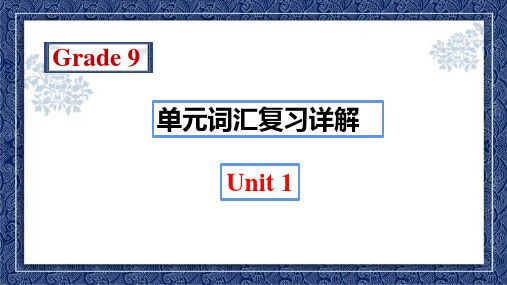
will get.
A. the more careless B.the more careful
C. the harder
D. the worse
4. Just search the Internet and you can get almost all the B you need.
A. message B. information C. picture D. story
Explaination
辨析: connect A with B & connect A to B 1. 用with指把A与B连接在一起,A、B之间不分主次。
Tim connected this(电线) wire with that one. 2. 用to指把A连接在B上,说话者以B为主,为A为辅。
Exercises
根据句意及汉语和首字母提示填写单词 1. The pain in his leg made him cry a loud (大声 地). 2. Dave had a long c onversation (谈话)on the phone with his teacher
yesterday. 3. —Mom, I forgot where I put my t extbook ( 课本) .Could you help me
pronounce n. pronunciation n. 发音;读法 I don't know how to pronounce this word. We should practice pronunciation every morning.
Explaination1. increase vi.
—I learn English D practicing conversations with friends.
Unit1+知识清单+-2024-2025学年人教版九年级英语全册
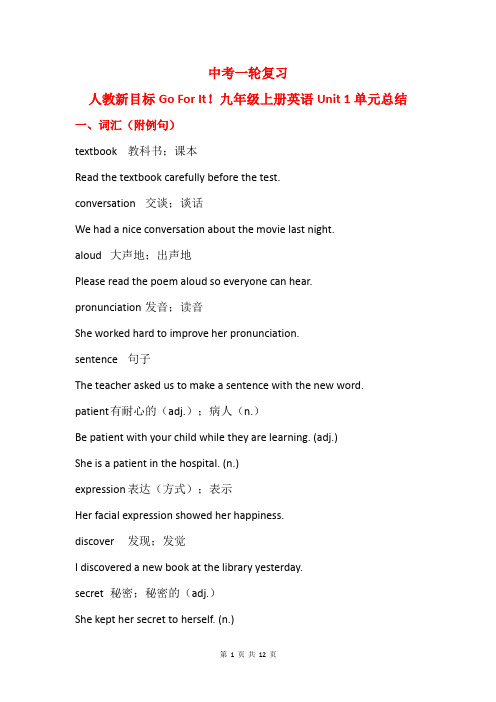
中考一轮复习人教新目标Go For It!九年级上册英语Unit 1单元总结一、词汇(附例句)textbook教科书;课本Read the textbook carefully before the test.conversation交谈;谈话We had a nice conversation about the movie last night.aloud大声地;出声地Please read the poem aloud so everyone can hear.pronunciation发音;读音She worked hard to improve her pronunciation.sentence句子The teacher asked us to make a sentence with the new word. patient有耐心的(adj.);病人(n.)Be patient with your child while they are learning. (adj.)She is a patient in the hospital. (n.)expression表达(方式);表示Her facial expression showed her happiness.discover发现;发觉I discovered a new book at the library yesterday.secret秘密;秘密的(adj.)She kept her secret to herself. (n.)This is a secret room in the house. (adj.)grammar语法I need to brush up on my grammar skills.repeat重复;重做Repeat the steps carefully to avoid mistakes.note笔记;记录(n.);注意;指出(v.)She took notes during the lecture. (n.)Please note that the deadline is next Friday. (v.)pal朋友;伙伴(非正式用语)My best pal and I have been friends since childhood.pattern模式;方式He found a pattern in the data that helped him solve the problem. physics物理学I enjoy studying physics because it's interesting.chemistry化学Chemistry is the study of matter and its interactions.partner搭档;同伴We worked on the project as partners.memorize记住;熟记Memorize these key points for the exam.increase增加;增长The population has increased significantly in recent years.speed速度(n.);加速(v.)She drove at a high speed on the highway. (n.)He sped up the car to pass the slow traffic. (v.)ability能力;才能She has a natural ability for music.brain大脑The brain is the control center of the body.active活跃的;积极的She is an active member of the school club.attention注意;关注Pay attention to the details of the problem.connect连接;与……有联系(v.);连接(n.)Connect the wires correctly to avoid sparks. (v.)The internet allows us to connect with people around the world. (n.) overnight一夜之间;在夜间The project was completed overnight by a team of experts.review回顾;复习She spent the evening reviewing her notes for the test. knowledge知识;学问She has a wealth of knowledge in ancient history.wisely明智地;聪明地He made a wise decision to invest in that company.二、短语知识(附例句)by making word cards 通过制作单词卡片释义:这是一种学习新单词的方法,通过制作卡片来加深记忆。
九年级英语一到三单元知识点

九年级英语一到三单元知识点Unit 1 How can we become good learners?一、重点单词。
1. textbook (n.) 教科书;课本。
2. conversation (n.) 交谈;谈话,常用于短语“have a conversation with sb.”(与某人交谈)3. aloud (adv.) 大声地;出声地。
区别于“loud”(adj. 大声的,常用来修饰名词,如a loud voice)和“loudly”(adv. 喧闹地,侧重于嘈杂、喧闹的声音)。
例如:Read aloud to practice pronunciation.(大声朗读来练习发音。
)4. pronunciation (n.) 发音;读音。
例如:His pronunciation is very good.(他的发音很好。
)5. sentence (n.) 句子。
6. patient (adj.) 有耐心的;n. 病人。
常用搭配“be patient with sb.”(对某人有耐心)。
例如:Our teacher is patient with us.(我们的老师对我们很有耐心。
)7. expression (n.) 表达(方式);表示;表情。
例如:Facial expressions can show our feelings.(面部表情能展示我们的情感。
)二、重点短语。
1. make word cards 制作单词卡片。
2. listen to tapes 听磁带。
3. ask the teacher for help 向老师求助。
4. read aloud 大声朗读。
5. have conversations with 与……交谈。
6. give a report 作报告。
7. word by word 逐字地。
8. the secret to... ……的秘诀。
例如:The secret to success is hard work.(成功的秘诀是努力工作。
Units 1-5重点单词词形变换专项练习-人教新目标九年级上学期英语期中复习

新目标九年级英语1-5单元重点单词词形变换Unit 11. adj. 大声的;响亮的,adv.大声地;响亮地________(比较级:________)→adv. 大声地;响亮地________(比较级:________) [注意:adv.大声地;出声地________]2. n. 发音;读音________→v. 发音________3. adj. 有耐心的________→n. 耐心;耐性________→(反义词)adj. 没有耐心的________4. n. 表情;表示;表达方式________→v. 表达;表示________5. v. 发现;发觉________→n.发现________6. v. 记住;记忆________→n. 记忆力________7. adj. 天生的________→v. 生育________(过去式:________)8. n. 能力;才能________→adj. 有能力的________9. v. 创造;创建________→adj. 有创造力的________10. adj. 积极的;活跃的________ →adv. 活跃地;积极地________11. v. (使) 连接;与……有联系________ →n. 连接;联系________12. n. 知识;学问________→adj. 知识渊博的________13. adv. 明智地;聪明地________→adj. 明智的;聪明的________Unit 21. n. 陌生人________→adj. 陌生的;奇怪的________2. n. 神;上帝________ →n. 女神________3. v. 放置;安放;产卵;下蛋________(过去式:________;过去分词:________)4. v. 存在;平躺;处于________(过去式:________;过去分词:________)5. v. 撒谎________(过去式:________;过去分词:________)6. adj. 死的;失去生命的________→v. 死;逝世________→n. 死;死亡__________7. v. 处罚;惩罚________→n. 处罚;惩罚________8. n. 温和;温暖________→adj. 温暖的;温和的________Unit 31. adv. 通常;正常情况下________→adj. 正常的________2. v. 建议;提议________→n. 建议;提议________3. adj. 中心的;中央的________→n. 中心;中央________4. adj. 东方的;东部的;adv. 向东;朝东;n. 东;东方________→adj. 东部的________5. adj. 不昂贵的________→adj. 昂贵的________6. adj. 不拥挤的;人少的________→adj. 拥挤的________→n. 人群,v. 挤满;充满________7. adj. 便利的;方便的________→adj. 不便利的________8. n. 方向;方位________→adj. 直接的;直达的,v. 导演;指挥________→adv. 直接地________→adj. 间接的________ →n. 导演;董事;负责人________9. adj. 正确的;恰当的________→(反义词)adj. 错误的________→adv. 正确地;恰当地________10. adj. 有礼貌的;客气的________→adj. 不礼貌的;粗鲁的________ →adv. 礼貌地;客气地________ →n. 礼貌________11. n. 发言者;讲某种语言的人________→v. 说;讲;发言________(过去式:________;过去分词________)→n. 演讲;发言________Unit 41. adj. 有幽默感的;滑稽有趣的________ →n. 幽默________2. adj. 不说话的;沉默的________→n. 沉默________→adv. 不说话地;沉默地________3. adj. 有用的;有帮助的________→v. 帮助________4. v. 采访;面试,n. 面试;访谈________ →n. 主持面试者;采访者________5. n. 害羞;腼腆________ →adj. 害羞的;内向的________(比较级:________;最高级:________) →adv. 害羞地________6. adj. 欧洲(人)的,n. 欧洲人________→n. 欧洲________7. adj. 非洲(人)的,n. 非洲人________→n. 非洲________8. v.不及格;失败;未能(做到)________ →n. 失败________9. n. 考试;审查________→v. (仔细地)检查________10. adv. 确切地;精确地________→adj. 精确的;准确的________11. n. 自豪;骄傲________→adj. 自豪的;骄傲的________12. n. 介绍________ →v. 介绍________Unit 51. v. 生产;制造;出产________ →n. 产品________2. adv. 广泛地;普遍地________ →adj. 广泛的________3. n. 环境________→adj. 自然环境的;有关环境的________4. v. 知道________ →adj.被知晓的;出名的________5. n. 德国________ →adj. 德国的,n. 德语,德国人________(复数:________)6. n. 法国________→adj. 法国的,n. 法语________7. v. 庆祝________ →n. 庆祝活动________8. n. 历史________ →adj. (有关)历史的________9. v. 完成________ →adj. 完整的;完全的________→adv. 完全地;彻底地________参考答案Unit 1一、1. loud louder loudly more loudly aloud2.pronunciation pronounce3.patient patience impatient4.expression express5.discover discovery6.memorize memory7. born bear bore8. ability able9. create creative10. active actively11. connect connection12. knowledge knowledgeable13. wisely wiseUnit 21.stranger strange2. god goddessy laid laid 4. lie lay lain5.lie lied lied6. dead die death7. punish punishment8. warmth warmUnit 31.normally normal2. suggest suggestion2.central center 4. east eastern5.inexpensive expensive6. uncrowded crowded crowd6.convenient inconvenient8. direction direct directly indirect director 9.correct incorrect correctly10. polite impolite politely politeness11. speaker speak spoke spoken speechUnit 41.humorous humor2. silent silence silently2.helpful help 4. interview interviewer5.shyness shy shyer shyest shyly6. European Europe6.African Africa8. fail failure10.examination examine10. exactly exact11. pride proud12. introduction introduceUnit 51.produce product2. widely wide2.environment environmental 4. know known5.Germany German Germans6. France French6.celebrate celebration8. history historical9. complete complete completely。
人教版九年级英语Unit1复习要点共14张PPT.

(2) I have remembered _C__ early every day.
A.get up B.got up C.to get up D.gets up
14. What about doing sth. ? 做某事怎么样?
6. find it + adj. to do sth. 发现做某事 ······
(1) (2018·眉山) We find __B_ impossible for us ____ a
foreign language well in a short time.
A. one;learn
B. it;to learn
river. 11. begin to do sth. 开始做某事
(1) 从我八岁时,我就开始跳舞了。 I have begun __t_o_d_a_n_c_e__ since I was 8 years old.
(2) 去年他开始学英语。 He _b_e_g_a_n_t_o_l_e_a_rn_ English last year.
(1) 回家怎么样?
What about __g_o_in_g__h_o_m_e___ ?
15. help sb. (to) do sth. help sb. with sth.
帮助某人做某事
(1) 我经常帮助妈妈做家务。
I usually help my mother __(_to_)_d_o__ housework.
8. practice doing sth. 练习做某事 (1) Do you often practice __B___ English at home?
人教版九年级unit1-5-笔记整理

英语笔记整理Unit1短语1.ask sb for help 向某人寻求帮助We should ask the teacher for help when we are in trouble .2.listen to tapes 听录音eg.listening to tapes is a good way to practice listening .3.have conversations with friends 和朋友做对话4.give a report 作报告5. spoken English 英语口语7.finish doing something 8. at first 首先9.word by word 逐词10.be patient 耐心的10. be afraid to do = be afraid of doing 害怕11. because of 由于12.fall in love with 爱上Eg, I was afraid to ask question because of my poor pronunciation。
13.look up 查找eg。
I look them up in a dictionary。
14.so that 为了15.take notes记笔记eg. We should take notes in class16.learn from 向..学习eg we should learn from him .17.keep a diary 写日记18.the secret to …的秘诀19 make mistake 犯错eg . I often make mistake in grammar。
20. be born with 天生具有21. the ability to …的能力Eg Everyone is born with the ability to learn.22. whether or not 是否23.be interested in 对…感兴趣24.depend on 依靠取决于eg . we shouldn’t depend on our parents.25.in common 共同点26.connect… with 和…连接起来eg :Good learners have some good habits in common.27.pay attention to 留心eg。
新人教版九年级上册英语Units 1-5知识点

九年级上册英语Units 1-5知识点Unit 1 How can we become good learners?一、重点短语1. have conversation with sb. 同某人谈话2. too…to… 太……而不能3. the secret to… ……的秘诀4. be afraid of doing sth./ be afraid to do sth.害怕做某事5. look up查阅6. repeat out loud大声跟读7. make mistakes in在……方面犯错误8. connect……with…把……和……连接/联系起来9. get bored感到厌烦10. be stressed out焦虑不安的11. pay attention to注意;关注12. depend on取决于;依靠13. the ability to do sth.. 做某事的能力14. native speaker说本族语的人15. make up组成、构成16. decide to do sth. 决定做某事17. not…at all一点也不,根本不18. laugh at sb. 笑话;取笑(某人)19. take notes做笔记,做记录20. deal with处理21. talk about谈论,议论,讨论22.talk to sb / talk with sb与某人说话23.be / get excited about sth. 对…感兴奋24. first of all首先25. make mistakes犯错24each other彼此26. change… into… 将…变为…二、固定结构1. by + doing:通过……方式(做某事)(by是介词,后面要跟动名词即动词的ing形式,不能跟不定式)Eg. I study English by watching English movies2. end up doing sth : 终止做某事,结束做某事Eg:The party ended up singing. 晚会以唱歌而结束。
人教版九年级上册英语unit1-5知识点

人教版九年级上册英语unit1-5知识点Unit 1: Getting to Know Each OtherIn the first unit of the ninth-grade English textbook, we delve into the theme of getting to know each other. This unit not only helps students build connections with their classmates but also teaches them valuable language skills. Let's explore some key knowledge points covered in this unit.Firstly, students learn about personal introductions. They are introduced to phrases such as "Nice to meet you," "What's your name?" and "Where are you from?" These phrases enable students to introduce themselves confidently and initiate conversations with their peers in English.Next, they familiarize themselves with greetings and goodbyes. This not only includes common expressions like "Hello," "Good morning," and "Goodbye," but also more informal phrases like "What's up?" and "See you later." Understanding these greetings and goodbyes allows students to engage in simple conversations and express their friendliness.Additionally, this unit focuses on asking and answering simple questions. Students learn how to inquire about someone's age, birthday, phone number, and hobbies. They also practice answering these questions using appropriate language structures. This develops their conversational skills and encourages interactive practice in English.Moreover, students learn about describing people's appearance and personalities. They get introduced to vocabulary related to physical appearance, such as hair color, eye color, height, and weight. They also learn adjectives to describe one's character traits, such as friendly, outgoing, and diligent. This vocabulary enables students to express themselves more accurately and create stronger connections with others.Unit 2: My School LifeMoving on to the second unit, we dive into the topic of school life. This unit focuses on familiarizing students with school-related vocabulary, daily routines, and expressing personal opinions. Let's explore some of the key knowledge points covered in this unit.To begin, students learn words related to the school environment, such as classroom, library, laboratory, and playground. They also learn vocabulary associated with subjects like math, science, English, andhistory. Understanding these words allows students to navigate their school environment and talk about their favorite subjects.The unit then introduces phrases and expressions related to daily routines. This includes discussing activities like waking up, eating breakfast, going to school, attending classes, and doing homework. Students also learn adverbs of frequency like "often," "sometimes," and "never" to describe the frequency of their daily activities. This vocabulary helps students express their routines and compare them with their classmates.Furthermore, students are encouraged to express their opinions about school life. They learn language structures like "I like/don't like," "I love/hate," and "I prefer..." to talk about their preferences regarding subjects, teachers, and school activities. This allows them to engage in discussions and express their perspectives confidently.Unit 3: My Free TimeIn the third unit, students explore the theme of free time activities. This unit focuses on expanding their vocabulary related to hobbies, discussing leisure activities, and expressing preferences. Let's delve into the key knowledge points covered in this unit.Firstly, students learn vocabulary related to popular hobbies and leisure activities. This includes words like reading, playing sports, dancing, painting, and playing musical instruments. Understanding these words enables students to describe their hobbies accurately and engage in conversations about leisure activities.Next, students practice discussing their free time activities using appropriate language structures. They learn how to express their preferences, such as "I enjoy playing basketball," "I prefer watching movies," and "I don't mind swimming." This helps students express their likes and dislikes with confidence and engage in conversations about their interests.Additionally, this unit explores the concept of time phrases and adverbs related to free time activities. Students learn words like "every day," "sometimes," "often," and "never" to describe the frequency of their hobbies. This vocabulary allows them to discuss how often they engage in specific activities and compare their routines with others.Unit 4: Our School RulesThe fourth unit delves into the topic of school rules and regulations. This unit not only teaches students about the importance of following rules but also encourages them to express their opinions on different rules. Let's explore the key knowledge points covered in this unit.Firstly, students learn vocabulary related to school rules, such as "no running," "no littering," and "respect others." They understand the importance of following these rules to maintain a conducive learning environment and promote a sense of discipline among students.Next, they practice using language structures to express their opinions on different rules. Students learn phrases like "I think," "I believe," and "In my opinion" to construct sentences expressing their thoughts. This fosters critical thinking skills and encourages students to evaluate rules based on their merits.Additionally, this unit introduces students to the concept of consequences for breaking school rules. Students learn phrases like "get a warning," "detention," and "suspend from school." They understand that actions have consequences and the importance of adhering to rules to avoid disciplinary actions.Lastly, this unit encourages students to propose new school rules or modifications to existing ones. They learn how to use language structures like "I suggest," "We should," and "It would be better if" to express their ideas. This fosters creativity and allows students to engage in discussions about school rules constructively.Unit 5: A Trip to A Famous Historical SiteThe fifth and final unit of the ninth-grade English textbook focuses on historical sites and cultural heritage. This unit not only explores famous landmarks but also teaches students about the importance of preserving historical sites. Let's explore the key knowledge points covered in this unit.Firstly, students learn vocabulary related to famous historical sites around the world, such as the Great Wall of China, the Pyramids of Egypt, and the Colosseum in Rome. They understand the significance of these landmarks and the cultural heritage associated with them.Next, they explore the concept of cultural preservation. Students learn about the importance of preserving historical sites for future generations. They discuss the benefits of cultural preservation andbrainstorm ideas on how to protect these landmarks from destruction and decay.Furthermore, this unit focuses on developing students' descriptive writing skills. They practice using appropriate adjectives and adverbs to describe historical sites vividly. This helps students develop their language skills and write engaging descriptions of famous landmarks.Lastly, this unit encourages students to plan a trip to a historical site. They learn how to discuss transportation, accommodation, and itinerary using appropriate language structures. This activity fosters critical thinking, planning skills, and encourages students to explore various destinations worldwide.ConclusionThe first five units of the ninth-grade English textbook provide students with a comprehensive foundation in language skills and cultural knowledge. From facilitating introductions and fostering connections to exploring school life, hobbies, school rules, and historical sites, these units cover a wide range of topics. By understanding and applying the knowledge points covered in these units, students can communicate effectively in English, express theirthoughts and preferences confidently, and engage in discussions about various aspects of life.。
冀教版英语九年级全一册unit1复习
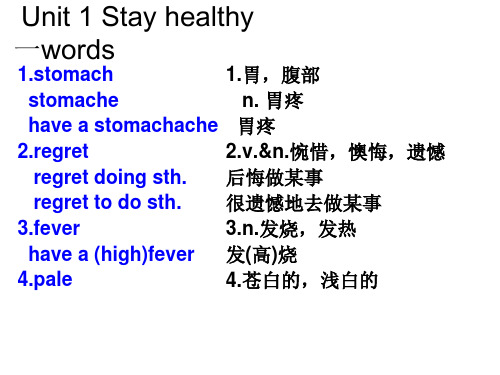
一words
1.stomach
1.胃,腹部
stomache
n. 胃疼
have a stomachache 胃疼
2.regret
2.v.&n.惋惜,懊悔,遗憾
regret doing sth. 后悔做某事
regret to do sth. 很遗憾地去做某事
3.fever
3.n.发烧,发热
have a (high)fever 发(高)烧
4.pale
4.苍白的,浅白的
5.examination(s) 5.n.检查,考试
6.pain
6.n.疼痛
have a pain in
身体某部位疼
7.pardon
7.v.&n.原谅
8.X-ray
8.X光,X射线
take an X-ray
rot
v.腐烂
13.fortunately=luckily 13.adv.幸运地
fortunate=lucky
adj.幸运的
luck
n.运气
14.aching
14.疼痛的
ache 15.German(s)
v.疼痛 15.adj.德国的 n.德语,德国人
Germany
n. 德国
16.wolf
16.狼
wolves
15.A balanced diet will keep you healthy and give you lots of energy!
16.She dares to try many things.
17.Jane is married and has two children.
九年级英语复习课教案:单位1至5
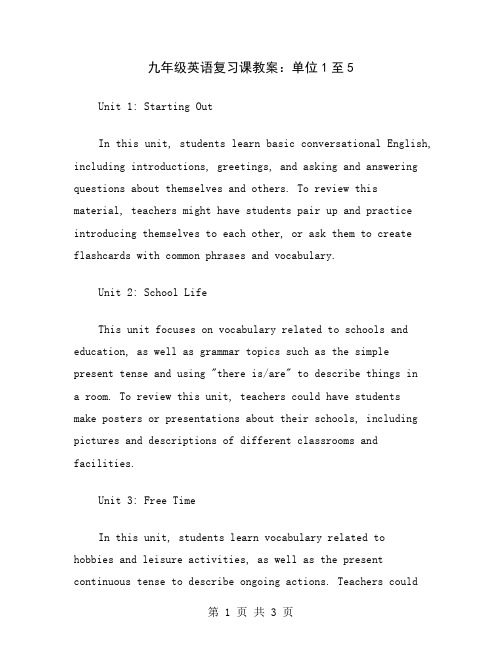
九年级英语复习课教案:单位1至5Unit 1: Starting OutIn this unit, students learn basic conversational English, including introductions, greetings, and asking and answering questions about themselves and others. To review this material, teachers might have students pair up and practice introducing themselves to each other, or ask them to create flashcards with common phrases and vocabulary.Unit 2: School LifeThis unit focuses on vocabulary related to schools and education, as well as grammar topics such as the simplepresent tense and using "there is/are" to describe things ina room. To review this unit, teachers could have studentsmake posters or presentations about their schools, including pictures and descriptions of different classrooms and facilities.Unit 3: Free TimeIn this unit, students learn vocabulary related tohobbies and leisure activities, as well as the present continuous tense to describe ongoing actions. Teachers couldreview this material by having students write short paragraphs about what they like to do in their free time, or by having them act out different activities in small groups.Unit 4: Food and DrinkThis unit covers food-related vocabulary and grammar topics such as countable and uncountable nouns, and using "some" and "any" to talk about quantity. To review this unit, teachers might have students work on a project where they plan a menu for a party, using different foods and drinks and making sure to use the correct grammar forms.Unit 5: PlacesFinally, in unit 5 students learn vocabulary related to cities, buildings, and transportation. Grammar topics include prepositions of place and using "have got" to talk about possession. To review this unit, teachers could have students design a map of their city or a fictional city, including labels for different buildings and means of transportation.Of course, these are just some suggestions for reviewing the material covered in units 1 through 5 of a ninth-grade English curriculum. Teachers can use their own creativity andexpertise to come up with engaging and effective review activities that will help their students feel confident and prepared for any end-of-year assessments. Good luck!。
- 1、下载文档前请自行甄别文档内容的完整性,平台不提供额外的编辑、内容补充、找答案等附加服务。
- 2、"仅部分预览"的文档,不可在线预览部分如存在完整性等问题,可反馈申请退款(可完整预览的文档不适用该条件!)。
- 3、如文档侵犯您的权益,请联系客服反馈,我们会尽快为您处理(人工客服工作时间:9:00-18:30)。
Unit1--5 复习2一.根据汉语提示完成单词。
1.We often listen to tapes to practice ___________(发音).2.Studying _________(语法) is a great way to learn English .3 I _________(意识到)that reading is important.4.My cousin is very _________(活跃的).5 __________(知识) is power.6.Try to have more_____________(谈话,交谈) with your friends.7.Little Tom is clever and he has the _________(能力)to write at the age of 3.8.Her grandfather has been _________(死)since two years ago. 9.Let’s enjoy the ________(温暖) of the sun .10.I saw a dog ________(躺) on the road on my way to school .11. I _______ (建议) trying it once more .12.He feels the need for _________ (方向) . 13. It is not ________ (方便的) to take the bus there.14.I don’t like the ________ (葡萄) because they taste sour. 15.Collecting __________ (邮票) is my hobby.16.Which is the ______(正确的)way to keep healthy ?17.They wanted to buy some __________ ( 明信片) for his families and friends on Christmas Day.18.Asking for help ________(礼貌地)is very important.19.His brother is a _______(管理人员) in the bank . 20.my father is always busy ______(发邮件)in the office.21. An_______(蚂蚁) can lift something much heavier than its own weight.22.He _____(不敢)speak in front of other people. 23.There are many ________(亚洲人) in this area.24.Don’t be ______(骄傲的). You’d better practice more.25.The ______(将军) ordered the soldiers not to run away.26. The heavy smog could have a great ________ (影响) on people’s health.27.We can’t get good ________(得分) if we work hard .28.You really ________(需要) hard work and help to finish the work.29. I don’t know his___________(背景).30,All of them are working in __________(沉默).31. They are used to using ____________ (筷子) now.32. This cup is made of __________ (玻璃).33. The __________ (表面) of this book feels soft. 34. Can you ____________ (完成) this sentence in English?35. His dream is to take part in some ____________ (国际的) games.36. The paper is folded before it is cut with ___________ (剪刀).37. Beijing is a __________ (生气勃勃) city in China.38. We were late because of the heavy ____________ (交通).39. We should _________ (避免) being hurt in these sports.40. This is a famous company. They have many good _________ (产品).二.用所给单词的适当形式填空。
1.I am __________ (excite) to go swimming.2.The air in the village is much ______(fresh)than that in the city .3.The restaurant is always busy, so come a little __________ (early) to get a table.4.When we have a meeting, we should listen to the __________ (speak) carefully.5. The hotel is _____ (exact) what we want. It’s a perfect one for us to stay in.6. It’s high time that we made a _______ (decide). There is no need to discuss it anymore.7. Young babies are _______ (interest) in hearing their mothers’ voices.8.She is not strong enough_______ (go) walking up mountains.9.When I walked past the park, I saw some old people_______ (do) Chinese Kongfu.10.Don’t give up_______ (study) hard. Because you are a good student.11.He was no longer interested in_______ (study).12.Finally,his parents made a decision ________ (send) him to a boarding school.13.My life _______ (change) a lot in the last few years.14.At last, he made an important_______ (decide).15,He studies English by ____________(read) the textbook.16.She thinks ______________(memorize) the words of pop songs can help him a lot.17.Great changes ___________(happen) in our hometown in the past 15 years.18 Everyone needs to have at least eight ____________(hour) sleep a night.19.If she ___________(be) you,she’d wear a skirt.20.She ___________(drop) the plate and it broke into pieces.语法填空:Full Moon, Full Feelings1)Chinese people ____ (celebrate)the Mid- Autumn Festival and _____ (enjoy) mooncakes for centuries. Mooncakesare ___ (呈…的形状) a full moon on the Mid-Autumn night. They ____ (carry) people’s wishes to the families the y love and miss.There ___ (be) many traditional folk stories aboutthis Festival. However, most people _____ (think)that the story of Chang’e __ (be) the most touching.Chang’e ___ (be) Hou Yi’s beautiful wife. After Hou Yi ____ (shoot) down the nine suns.a goddess ____ (give) him magic medicine _______(thank) him. Whoever _____ (drink) this ________(live) forever, and Hou yi _______ (plan) ________(drink) it with Chang’e. However, a bad man, PangMeng, tried _______ (steal) the medicine when HouYi ___ (be) n ot home. Chang’e refused ______ (give) it to him and ______ (drink) it all. She ________ (become) very light and ____ (fly) up to the moon. Hou Yi ____ (be) so sad that he _____ (call) out her name to the moon every night. One night, he _____(find) that the moon _____ (be) so bright and round that he ________ (see) his wife there.He quickly ____ (lay) out her favorite fruits anddesserts in the garden. How he _______ (wish) that Chang’e___________ (come) back!After this, people _______ (start) the tradition of _________ (admire) the moon and _______ (share)mooncakes with their families.2)Good speakers ______(change) the way they ______(speak) in different _________(situation). The expressions they use__________( depend ) on______( who) they_________ (speak) to or how well they _______(know) each other well. It is all right ________(ask) direct questions to your classmates because you_____( know) them_______( well). However, if you _______(say) to your teacher, “When is the school trip?”, this ____________ (sound )impolite. But if you say, “Excuse me, Mr. West. Do you know when the school trip_____(be)?”, this ________ (sound)much________(polite).改错:When you visit the foreign country, it is important to know how to ask for help polite. For examp le, “Where are the restrooms?” or “Could you please tell me where the restrooms are?” are similar requests for direction.All are correct English, and the first one sound less polite. That is why it is a very direct question. It is not enough to just ask the question correct. We also need to learn how to be politely when we asking for help.翻译1.你读的书越多,你的速度就越快。
